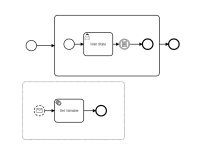-
Type:
Bug Report
-
Resolution: Unresolved
-
Priority:
L3 - Default
-
None
-
Affects Version/s: None
-
Component/s: engine
-
None
Scenario:
- Process with a conditional event (see attached model, the embedded sub process is important to avoid OLE on the process instance execution)
- Condition is initially not fulfilled
- Transaction 1: Enters conditional event
- Transaction 2: Sets variable that would trigger conditional event
- Transactions 1 and 2 occur in parallel with arbitrary interleaving
Expected behavior:
- Once both transactions have finished, the variable is set and the conditional event has triggered
Current behavior:
- In some situations, both transactions have comitted, the variable is set, but the conditional event has not triggered
- The reason is a race condition in which each transaction does not yet see the effect of the other, but there is no synchronization between them that would detect this problem
Implementation consideration:
- The solution requires synchronization between the two transactions, such that it is guaranteed that one of them always sees the effects of the other before committing
Solution Outline:
- There is a new process engine configuration option called strictSynchronizationForConditionalEvents
- If set to false, the behavior of the process engine does not change (i.e. it works as if this bug is not fixed)
- If set to true, if a process contains a conditional event, the process engine will always synchronize a process instance on the following operations:
- Any command that sets variables
- Any command that creates a conditional event subscription (i.e. that enters a conditional event in the BPMN model)
- Technically, the synchronization is implemented as an increment of the revision of the corresponding process instance execution in the ACT_RU_EXECUTION table
- In consequence, the following behavior can be observed
- Case 1
- Parallel transaction 1 sets a variable
- Parallel transaction 2 enters a conditional event
- Transaction 1 commits first and is successful.
- Transaction 2 rolls back and fails with OptimisticLockingException
- Case 2
- Parallel transaction 1 sets a variable
- Parallel transaction 2 sets a variable
- Transaction 1 commits first and is successful.
- Transaction 2 rolls back and fails with OptimisticLockingException
- Case 3
- Parallel transaction 1 enters a conditional event
- Parallel transaction 2 enters a conditional event
- Transaction 1 commits first and is successful.
- Transaction 2 rolls back and fails with OptimisticLockingException
- Case 1
- The default value of the flag is false. This is because this strict synchronization behavior will also affect cases that do not need it (e.g. from above: case 3 and case 2 most of the time) and this bug is rarely encountered in practice
- The documentation of the flag clearly explains for which cases it is relevant, its implications and users are well informed to decide if they should activate it or not
- is related to
-
CAM-10715 Avoid conditional event race condition with selected batch APIs
-
- Closed
-
